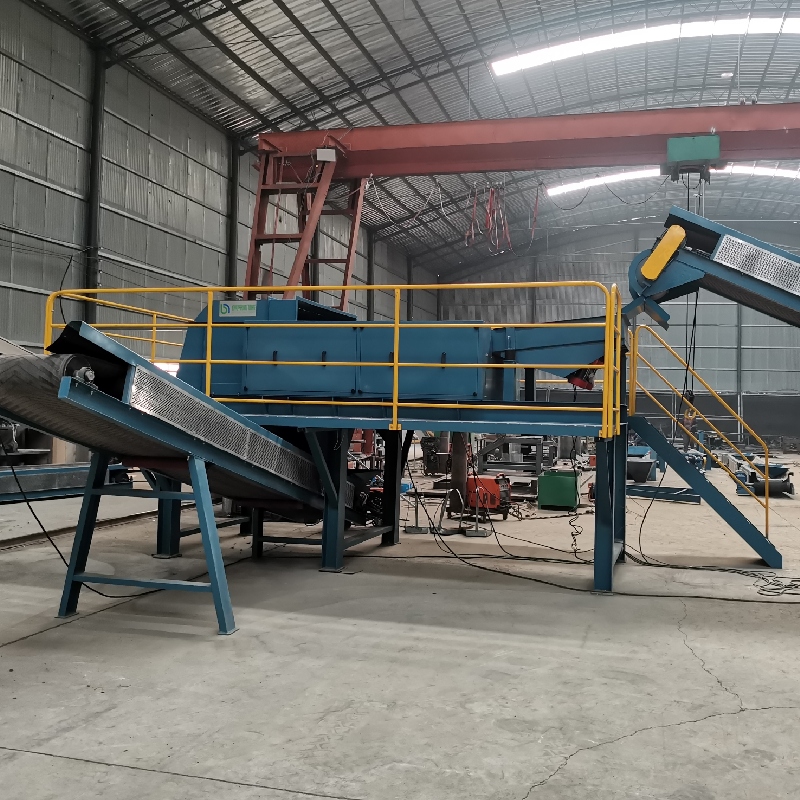
10 月 . 19, 2024 07:42 Back to list
The Rise of Scrap Crushers Revolutionizing Waste Management
In an era where environmental concerns and sustainability practices have taken center stage, the recycling industry is experiencing unprecedented growth. Among the key players in this sector are scrap crushers, innovative machines specifically designed to process and recycle various types of metal scrap. These devices not only aid in reducing waste but also play a crucial role in preserving natural resources. In this article, we will explore the significance of scrap crushers, their working mechanisms, and their lasting impact on the environment and economy.
Understanding Scrap Crushers
Scrap crushers are heavy-duty machines that compress and reduce the size of scrap metal, making it easier to transport, recycle, and repurpose. They operate by applying immense pressure to break down large metallic structures—such as old vehicles, appliances, and industrial scrap—into manageable pieces. This finely processed metal can then be melted down and reused, thereby conserving valuable raw materials and minimizing environmental degradation.
The types of scrap that can be processed include ferrous scrap (iron and steel) and non-ferrous scrap (aluminum, copper, brass, etc.). Each type of metal requires specific processing techniques and equipment. Scrap crushers may vary in design, from small mobile units suitable for on-site use to larger stationary models used in recycling facilities.
The Working Mechanism of Scrap Crushers
The operation of a scrap crusher typically involves several key stages
1. Feeding The scrap material is fed into the machine, either manually or via conveyor systems. 2. Crushing Powerful hydraulic or electric motors harness significant force to crush the metal scrap. Some crushers use rotating hammers or shear blades, effectively breaking the material into pieces. 3. Sorting After crushing, the metal shavings and chunks are often passed through a series of conveyor belts equipped with magnetic separators. This process helps separate ferrous materials from non-ferrous ones, ensuring that different types of metal can be treated appropriately. 4. Bailing Finally, the processed scrap can be compressed into bales for easier handling, transportation, and storage.

This streamlined process not only increases efficiency but also elevates the quality of the recycled metal, making it more suitable for the manufacturing industry.
Environmental and Economic Impact
The use of scrap crushers contributes significantly to environmental protection by reducing landfill waste and minimizing the extraction of virgin materials
. Traditional mining and processing of metals have severe ecological consequences, including habitat destruction and pollution. By recycling scrap metal, scrap crushers help to mitigate these issues, leading to a reduced carbon footprint and a lower environmental impact.Economically, the recycling industry bolstered by scrap crushers provides numerous benefits. It creates jobs in areas such as processing, logistics, and manufacturing. Recycling metal is also more cost-effective than mining new resources, which can lead to lower prices for consumers. In volatile markets where raw materials fluctuate significantly, the availability of recycled metal can stabilize prices and ensure a consistent supply chain for industries relying on these materials.
Furthermore, scrap crushers promote a circular economy, wherein materials are kept in use for as long as possible. This reduces the need for new resources, promotes innovation in recycling technologies, and encourages a culture of sustainability.
The Future of Scrap Crushers
As technology continues to advance, the efficiency and capabilities of scrap crushers are expected to improve further. Emerging technologies, such as artificial intelligence and machine learning, are being integrated into recycling processes to enhance sorting accuracy and operational efficiency. Additionally, electric-powered scrap crushers are gaining popularity, aligning with global efforts to reduce carbon emissions and promote cleaner energy solutions.
In conclusion, scrap crushers play a vital role in transforming how we manage waste materials, particularly metals. By facilitating recycling processes, these machines contribute to environmental sustainability, economic efficiency, and resource conservation. As the world continues to advocate for sustainable practices, the demand for effective waste management solutions like scrap crushers will undoubtedly rise, paving the way for a greener future.
Latest news
Unveiling the Power of Eddy Current Separator
NewsSep.25,2024
Transform Your Home Recyclin:home metal shredder
NewsSep.25,2024
The Future of Waste Management with Recycling Line Picker
NewsSep.25,2024
The Benefits of a Metal Recycling Plant
NewsSep.25,2024
Revolutionize Material Separation with Onwang Technology
NewsSep.25,2024
Innovative Waste Management: Unveiling the MSW Sorting Plant
NewsSep.25,2024